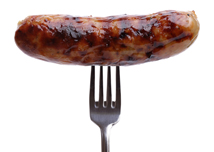NCD Watch
Know More About Processed Meat and Cancer
30 Nov 2015 (Mon)
 Processed meat has recently been classified as
carcinogenic to humans
(Group 1)
by the International Agency for Research on Cancer (IARC) of the World Health Organization.
Processed meat has recently been classified as
carcinogenic to humans
(Group 1)
by the International Agency for Research on Cancer (IARC) of the World Health Organization.
Processed meat refers to meat products that have been handled by salting, curing, fermentation, smoking, or other processes to enhance flavour or improve preservation. Examples of processed meat include hot dogs (frankfurters), ham, sausages, bacon, corned beef, biltong or jerky, canned meat (e.g. luncheon meat), and instant meat-based preparations, as well as Chinese-style preserved sausages and salted fishes, etc.
Agents are classified as carcinogenic to humans (Group 1) when there is sufficient evidence, usually derived from epidemiological studies, of cancer causing in humans. Therefore, the current conclusion by the expert group of the IARC that processed meat is classified as carcinogenic to humans (Group 1) was because there has been sufficient evidence in humans that the consumption of processed meat causes colorectal cancer. In the studies reviewed, the risk generally increased with the amount of processed meat consumed. The experts concluded from an analysis of data from 10 studies that every 50 gram portion of processed meat eaten daily increases the risk of colorectal cancer by about 18%.
Of note, the IARC classifications describe the strength of the scientific evidence about an agent being a cause of cancer, rather than assessing the level of risk. That is to say, even though processed meat and tobacco smoke are assigned to the same category, this does not imply they are at equal risk of causing cancer. According to the most recent estimates by the Global Burden of Disease Project, an independent academic research organisation, about 34 000 cancer deaths per year worldwide are attributable to diets high in processed meat. These numbers contrast with about 1 million, 600 000 and more than 200 000 cancer deaths per year globally due to tobacco smoking, alcohol consumption, and air pollution respectively.
To maintain optimal health and reduce risk of getting cancer, members of public are advised to minimise the intake of processed meat if possible, while adopting other healthy lifestyles, such as adequate intake of fruits and vegetables, active lifestyle, not smoking and avoidance of alcohol use, etc.






































